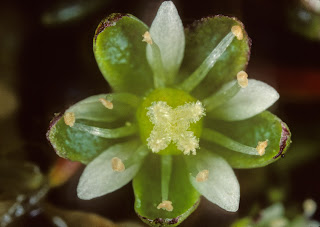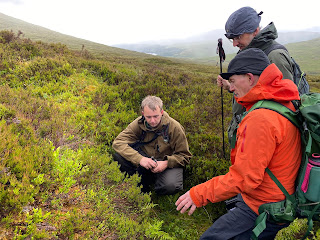 |
| Snow pearlwort Image: Sarah Watts |
These species all require a cool climate at high altitude, so as the planet warms up, they have to move further northwards and upwards - until there is nowhere further for them to go. They also face competition from those lowland species colonising upland areas as they try to escape the effects of rising temperatures.
 |
| Sarah & Robin recording at Corrour, July 2022 Image Jim McIntosh |
Sarah's research is based on over 40 years' monitoring of the rare plants of Ben Lawers by staff and volunteers from the National Trust for Scotland. In a press release issued by Univ. Stirling, Sarah, who has spent the past twelve years as part of that team, said "Our research signals a rapid loss of biodiversity happening right now, which means that, if it's allowed to continue on this accelerated trajectory, due to climate change, we will see the extinction of species like these".
Sarah is co-author on this paper about snow pearlwort published in British & Irish Botany, BSBI's scientific journal; this plant has declined by 66% since the mid-1990s, leading the BSBI to change its conservation threat status from Vulnerable to Endangered. Snow pearlwort is the first vascular plant to be re-classified as Endangered due to climate change, but it's unlikely to be the last.
 |
| Botanists Gus, Robin & Jim (in red) recording at Corrour, July 2022 Image Sarah Watts |
To find out more about the plants that Jim, Sarah and the team recorded at Corrour, click on their Twitter accounts (this is Jim's and this is Sarah's) and on the #Corrour hashtag - and check out the coverage about Sarah's recent research into those rare arctic-alpines in news outlets such as the Daily Mail and the BBC website.
No comments:
Post a Comment
Please leave a comment!